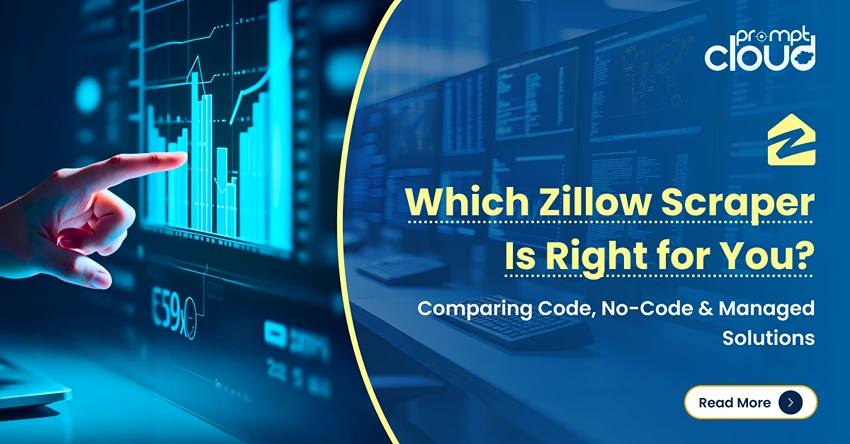Every company across the globe knows that the web contains valuable information that can be applied in their business irrespective of the industry. However, this untapped potential of web data largely gets hindered because of the unstructured nature, but if it can be extracted and applied correctly, then the benefit can be enormous. This is especially applicable in the finance domain, as the value realization can be relatively faster than in other industries. Here are two examples to put this into perspective:
- According to an article by Fortune, Irish research firm Eagle Alpha analyzed 7,416 comments from Reddit’s gaming thread in October 2015 to predict that the sales figure for Star Wars video game developed by Electronic Arts would be higher than the projected number; Electronic Arts quickly raised its sales forecast, citing “excitement” over the game.
- The analytics team at Goldman Sachs Asset Management monitored traffic on Alexa and pointed out a spike in visits to HomeDepot.com, which led to buying of home-improvement stock months before the company increased its projection and share price went up.
Essentially the early insights into marketing-moving factors, company information, and publicly available financial data can be extremely valuable. Now, web scraping as a business tool can be used to source alternate data or third-party data and apply that to gain a deep understanding of the market which can directly impact the bottom lines. In this post, we’ll discuss several use cases of web scraping in the financial industry.
Equity research
Asset management and investment firms can deploy web crawling to extract data to analyze fundamental trends. For example, continuous aggregation of performance data from websites that operate in specific markets can reveal trends. One of the most common use cases is the pricing and inventory data monitoring of clients’ sites and other portfolio sites. Since the web data extracted can be easily consumed, it is can be swiftly fed to the analytics system which can lead to a better investment strategy.
The same technology can be applied for various types of ratio analysis that take into account the company’s financial performance including solvency and profitability ratios. These analyses require data aggregation from income statements, balance sheets from numerous years to compare with other firms, and the industry average. All these data can be extracted in a clean format from the web minimizing manual effort.
Venture capital
VC firms need to stay abreast of the latest technology trends and the news surrounding portfolio companies apart from prospective companies. Before investing in a startup, research needs to be done from diverse sources like Angel List, VentureBeat, and TechCrunch to gather funding data. This is similar to the aggregation of vital business details including any publicly-available financial statements. This data can be used to aid the investment decision for startups.
In addition to that, analysts need to go through several sites to spot trends and compile buzzwords to identify the top trends. This can be both time consuming and erroneous. However, data extraction services can easily get clean data from desired sources so that the time is spent only on the analysis of data.
Financial data and ratings
Rating agencies can leverage web scraping to monitor and extract data from thousands of company sites. In fact, they can get live updates and near real-time updates to drive high-velocity research and analytics. Ultimately this can be a great value addition to their clients (institutional investors, banks, wealth managers, etc.) who can take better decisions by using the insights.
Risk mitigation and compliance
Regulatory compliance is crucial for any company, but because of the nature of the business companies in the finance and insurance space face additional scrutiny. Hence, it is beneficial to monitor government sites to detect any policy changes related to regulatory requirements.
Particularly, insurers should monitor news outlets and government sites to get live updates on critical events that can directly impact their business. The same also applies to firms who are into mortgage lending (examples can be the impact of flood or earthquake on the asset).
Market sentiment prediction
Sentiment analysis can be applied to the data gathered from various forums, blogs,s, and social networks. In this case, Twitter data adds tremendous value — for example, conversation (cashtagged tweets) on Twitter or any brand specific tweets can be accumulated and sentiment analytics can be performed to rate the bull and bear nature of the market on a specific scale.
Stock trading
A crowd-sourced taxonomy of tags that parse the world’s conversations on various public sites can be used to connect trending topics with companies in which investment can be done. The tags can be brands, celebrity endorsers, topics, cultural movements, and more — anything that could influence the business. This can reveal buy and sell indicators for stocks and ETFs. In addition to this, influencers and professional investors’ can be tracked so that their online mentions and discussions could provide insights on the future movement of the market. This can be applied to equities, ETFs, FX pairs, as well as commodities.
Digital ‘Expert Networks’
According to Investopedia, ‘Expert Network’ is a group of professionals who charge outsiders by providing specialized information and research services. Expert networks can be very large, encompassing tens of thousands of individuals with high-level knowledge of a variety of subjects. Since the web is the largest repository of information, a digital version of ‘Expert Network’ can be built by extracting data from thousands of sites. These can cover virtually any kind of topic — from Indian economics and QSRs in the USA to cryptocurrencies in Zimbawe and the Syrian refugee crisis.
Takeaway
Finally, there is no doubt that every business wants to be in an advantageous position when it comes to access to information and application of the same. In this regard, web scraping can be an apt business tool to gather the right information at the right time leading to higher market capitalization and a significant boost to the bottom line. Cloud-based managed service providers like PromptCloud have already built robust web crawling and extraction infrastructure which significantly reduces the time to market factor. Businesses just need to consume the data and focus on processing it to derive insights.
There is no limit on the web data — it is ever-growing and full of market-changing information.



















